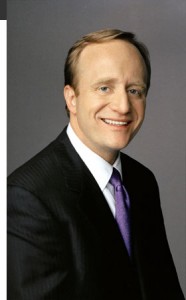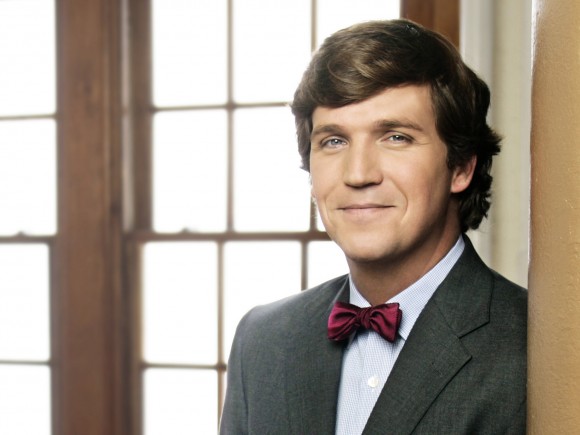News flash: a conservative and a liberal in Washington agree — on quite a few matters, in fact.
Before an audience of independent insurance agents last Friday, conservative commentator Tucker Carlson and liberal commentator Paul Begala agreed that the coming midterm elections could be difficult for Democrats.
Carlson predicted gains for Republicans in the midterm elections and Begala did not disagree during their panel at the annual legislative conference of the Independent Insurance Agents and Brokers of America (Big “I”).
Both pundits stopped short of predicting that Republicans, who already hold the majority in the House, will do well enough to wrest control of the Senate from Democrats.
Tucker is co-founder and editor-in-chief of The Daily Caller and hosts FOX and Friends Weekend. He formerly co-hosted CNN’s Crossfire and his own show on MSNBC.

Begala is a Newsweek/Daily Beast columnist and a CNN contributor. The former adviser to President Bill Clinton teaches at Georgetown University and is a senior adviser to Priorities USA Action, a progressive PAC.
Carlson said Democrats will be hurt by having to run on the Affordable Care Act, or Obamacare, although he predicted Democratic Sen. Mary Landrieu of Louisiana, who faces a tough re-election, will survive.
Begala said history does not favor Democrats in the midterms. Only two presidents who have been in office for six years, as President Obama has been, have ever gained seats, he said. However, while the outlook is not great for Democrats right now, Begala predicted that better news in coming months on Obamacare and on the economy could help Democrats.
Begala said he thinks Sen. Mark Pryor, an Arkansas Democrat, is in trouble but he also said he thinks Republican Sen. Mitch McConnell of Kentucky will lose either in the Republican primary or the general election.
Big “I” CEO Bob Rusbuldt, acting as panel moderator, criticized the Obama Administration for making changes to the Affordable Care Act, or Obamacare, by executive order while ignoring bipartisan calls for changes such as guidelines for navigators or changing the definition of full time employees.
Begala agreed that Obama and Democrats should listen to improvements because the law is not perfect but said the current political atmosphere does not allow politicians of different parties to compromise.
“We are not more polarized than we were under Bill Clinton but we are more paralyzed. The legislative process has broken down,” Begala said of politics in Washington. He said that on the Republican side, those who compromise get challenged in primaries or otherwise “fired.”
“You can’t love the Constitution and oppose compromise,” Begala said. “The Constitution is a compromise.”
Carlson said the political parties “sincerely disagree” and the problem is that there is no overlap between the Democratic and Republican parties today. “There is not a single Republican who is more liberal than the most conservative Democrat,” Carlson said.
Carlson also said he thinks the elimination of earmarks has reduced the need for lawmakers to compromise with one another.
The two political analysts appeared on the Big “I” stage right after President Obama accepted the resignation of Health and Human Services Secretary Kathleen Sebelius, who took much of the blame for the heavily-criticized roll-out of the federal Obamacare website.
The president immediately nominated Sylvia Mathews Burwell, the White House budget director, to replace Sebelius.
Carlson said Sebelius “was not up to the task but you can’t blame the debacle on one person.”
Given that a successor was named right away, the resignation of Sebelius may have been in the works for some time, according to Begala. “It’s like when the second marriage occurs five minutes after the first ends,” he said.
Both suggested that while tax reform is necessary, the time is not right and nothing will likely get accomplished on it in the near future.
“It will only happen when we start regarding compromise,” said Begala.
Carlson said a tax crisis is looming because a smaller segment of the population is supporting programs for a growing number of citizens, a situation he said that has been created by both parties over decades.
On foreign affairs, Carlson said Obama’s actions have been “accelerating trends” of diminishing American influence around the globe that started before he took office.
Begala said much of what happens in the world is “not about America.”
Both analysts said the U.S. war in Iraq was a mistake that has hurt U.S. interests by empowering Iran in the region.
“Iran won the Iraqi-American war,” said Begala.
They both downplayed Russia as a threat to the U.S.
Carlson said he thinks China is the biggest threat to the U.S., not Russia.
But Begala said he is more worried about Iran with nuclear ambitions than about China, which he said has not had a history of expansion.
Begala said the U.S. defense budget is $700 billion compared to $68 billion for Russia—or almost as much as Russian President Vladimir Putin spent on the winter Olympics.
Bipartisan Talks
Bipartisanship was the focus of House Majority Whip Kevin McCarthy (R-Calif.) and Rep. Steve Israel (D-N.Y.), Democratic Congressional Campaign Committee (DCCC) Chairman, who also addressed the insurance crowd.
McCarthy told the association’s members that they can use their political power to help make America’s future their own.
“Don’t blame somebody else for the problem,” said McCarthy, who started his own business in a small town in California when he was just 19 years old. “We should not leave our problems for another generation—we need to face them head on.”
Israel said that governing for the next generation must be a priority for all citizens and not only legislators. “What you do and what I do should be about building a future that creates stability, that anticipates and mitigates against risk and that manages unpredictability,” Israel said.
McCarthy said the nation must develop a national energy policy as well as reform the tax code, education, immigration and government itself by tackling unnecessary regulation. “We have to be able to compete,” he said. “If you eliminate risk, you have no growth.”
Israel discussed five trends that he said will affect America in the next two decades: a booming global middle class; rapid expansion of the elderly population; increasing movement back into cities; “breathtaking” acceleration of technology; and an “alarming” increase in demand for natural resources.
“It usually takes a long time to effectuate dramatic change but we are at one of those pivot points where the decisions we make now will fundamentally reshape the world for very good and for very bad over the next decade and a half,” Israel said. “We actually know what the risks are going to be and we have a sense of where the uncertainties lie.”
Both representatives suggested that the solution to the nation’s challenges is bipartisan politics. “Washington is not just the capital of United States of America—it’s the capital of blame,” Israel said. “That blame may make us feel good in terms of our partisan gratifications, but that blame is not going to put one person to work—and it’s not going to save a single small business.”
“I could speak to the same people that agree with me on the same issues, or I could expand the network and talk to them about an issue that they might not even know about that could affect them,” said McCarthy.
The two cited several insurance bills where bipartisanship has made or will make a difference: flood insurance reform, renewal of the Terrorism Risk Insurance Act (TRIA), and the National Association of Registered Agents and Brokers (NARAB) legislation — all supported by the Big “I”.
Israel agreed, telling the agents that TRIA and the new flood law as two ways “Democrats and Republicans have come together to do what you do: mitigate risk, provide peace of mind and create financial stability so that businesses and people can plan their futures.
“We have to get beyond blame to solutions,” the Democrat said.
Topics USA Agencies Legislation Russia Washington Independent Agencies
Was this article valuable?
Here are more articles you may enjoy.



 Insurify Starts App With ChatGPT to Allow Consumers to Shop for Insurance
Insurify Starts App With ChatGPT to Allow Consumers to Shop for Insurance  Fla. Commissioner Offers Major Changes to Citizens’ Commercial Clearinghouse Plan
Fla. Commissioner Offers Major Changes to Citizens’ Commercial Clearinghouse Plan  US Supreme Court Rejects Trump’s Global Tariffs
US Supreme Court Rejects Trump’s Global Tariffs  Experian Launches Insurance Marketplace App on ChatGPT
Experian Launches Insurance Marketplace App on ChatGPT 

